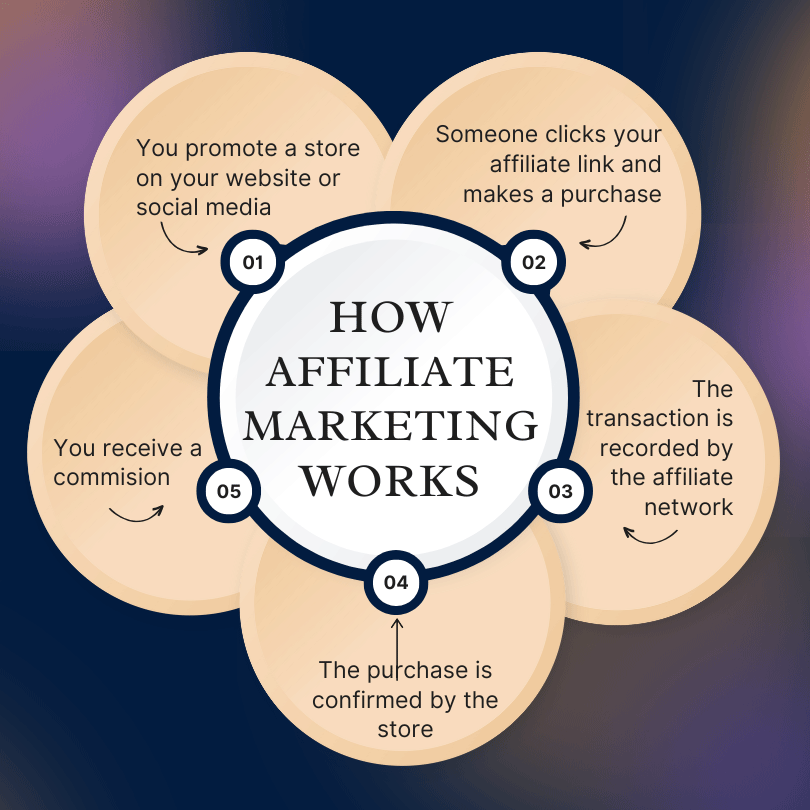Affiliate marketing is a type of performance-based marketing where an affiliate earns a commission for promoting someone else’s products or services. The affiliate, also known as a publisher, promotes the product or service to potential customers through various online channels such as blogs, social media, and email marketing. When a customer makes a purchase through the affiliate’s unique link, the affiliate earns a commission. This commission rate can vary depending on the affiliate program and the product or service being promoted.
How Does Affiliate Marketing Work?
The process of affiliate marketing involves three parties: the advertiser, the publisher, and the customer.
The advertiser, also known as the merchant or retailer, is the company that creates the product or service that the publisher promotes.
The publisher is the affiliate who promotes the advertiser’s product or service and earns a commission for each sale.
The customer is the person who purchases the product or service through the publisher’s unique affiliate link.
When an affiliate signs up for an affiliate program, they are given a unique affiliate link that they can use to promote the advertiser’s products or services. The link contains the affiliate’s unique ID, which is used to track sales made through the link. When a customer clicks on the affiliate’s link and makes a purchase, the sale is tracked and the affiliate earns a commission.
As an affiliate, you have the opportunity to engage with merchants via affiliate marketing programs. Once you establish some initial connections through a program, you can discover additional suitable merchants and gradually expand a broad network of brand partners within a specific industry.
For instance, if you are an affiliate that reviews gadgets, smartphones, an affiliate marketing program may recommend a variety of tech items for you to assess. This allows you to cultivate a network in this industry and concentrate on attracting new customers interested in tech products.
Occasionally, affiliates and merchants may connect naturally through direct outreach. For example, a merchant that produces baking pans might reach out to an affiliate who writes about baking to showcase their product to the affiliate’s audience of baking enthusiasts.
You can learn more about the affiliate marketing terminology here ⇓
How do you make money as an affiliate
Unlike certain sales positions, affiliate marketers can make money even if the individual they refer does not buy a product. While some affiliate marketing programs compensate per lead, others may offer payment based on clicks.
Pay-per-click: In pay-per-click affiliate marketing, you receive a commission each time a user clicks on a link that directs them to your affiliate partner’s site.
Pay-per-lead: Pay-per-lead affiliate marketing lets you earn a commission every time a user you referred completes a lead capture action, like filling out a contact form or signing up for a newsletter.
Pay-per-sale: Pay-per-sale operates similarly to traditional sales commission models, where you earn a percentage or fixed amount each time a user makes a purchase from your affiliate partner.
Benefits Of Affiliate Marketing
Affiliate marketing presents a wealth of benefits for both advertisers seeking effective promotional avenues and publishers looking to monetize their content efficiently.
For Advertisers
- Cost-Effective Advertising: For advertisers, affiliate marketing is an incredibly cost-effective strategy since they only pay for performance, meaning they only disburse funds when a sale is successfully made or a lead is generated. This performance-based payment structure minimizes financial risk and ensures a higher return on investment.
- Increased Reach and Visibility: Affiliates can help advertisers expand their reach significantly by promoting products and services across various platforms, which can include blogs, social media channels, and websites. This broadens the audience base and enhances visibility in the marketplace.
- Access to New Audiences: Advertisers benefit from the established audiences that affiliates have already cultivated. These affiliates often have loyal followers who trust their recommendations, thus allowing advertisers to tap into new customer segments that they may not have reached otherwise.
- Low Risk – Advertisers only pay for the advertising when a sale is made, making it a low-risk form of marketing.
- Brand Exposure – Affiliate marketing can help increase brand exposure by reaching new audiences through the publisher’s channels.
For Publishers
- Flexibility and Scalability: For publishers, affiliate marketing offers a flexible way to earn income. They can choose products and services that align with their content or audience interests, and they can scale their efforts according to their available time and resources.
- Passive Income Opportunities: Publishers can generate passive income through affiliate marketing, as they can earn commissions from sales made even when they are not actively promoting products. This creates a continuous revenue stream that can grow over time.
- Relationship Building: Affiliates often develop strong relationships with the brands they promote, leading to collaboration opportunities and long-term partnerships. This relationship building can foster trust and credibility, benefiting all parties involved.
- No Inventory – Publishers do not need to hold inventory or handle customer service, making it a low-maintenance form of marketing.
- Performance Tracking and Analytics: Publishers can take advantage of advanced tracking tools and analytics to measure the effectiveness of their campaigns. This data-driven approach allows them to optimize their strategies for better results continually.
Challenges Of Affiliate Marketing
While there are numerous benefits associated with affiliate marketing, there are also several significant challenges to take into consideration:
- Competition – Affiliate marketing has become an increasingly popular and well-established form of marketing in recent years. As a result, there can be intense competition among various affiliates for the opportunity to promote specific products or services. This saturation can make it difficult for new affiliates to gain visibility and traction in the market.
- Payment Delays – Some affiliate programs can have payment thresholds or delays that can be quite frustrating for publishers who are eagerly waiting to receive their hard-earned commissions. These delays can lead to cash flow issues for some affiliates, making it essential to choose programs that offer timely payments and clear terms.
- Trust – Publishers need to exercise caution when promoting products or services that may not have a solid reputation or positive track record. Promoting questionable offerings can seriously damage an affiliate’s reputation and credibility in the eyes of their audience, potentially resulting in lost trust and future business opportunities. It is crucial for affiliates to thoroughly vet the products they endorse to maintain their integrity and foster a loyal following.
Conclusion
Affiliate marketing is a powerful form of marketing that can benefit both advertisers and publishers. By understanding how it works and the benefits and challenges involved, businesses can make informed decisions about whether to implement an affiliate marketing strategy. Publishers can also benefit from this form of marketing by earning a source of passive income through promoting products or services that they believe in.









